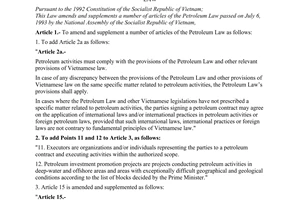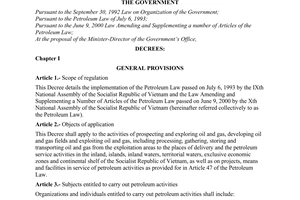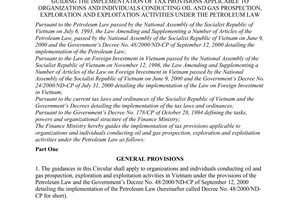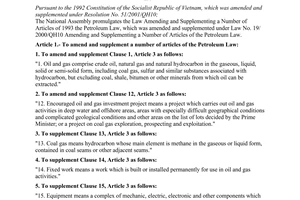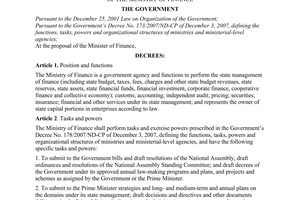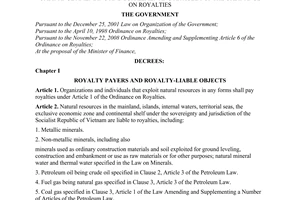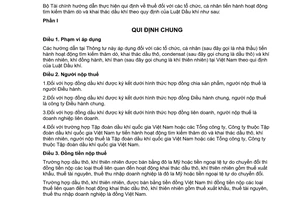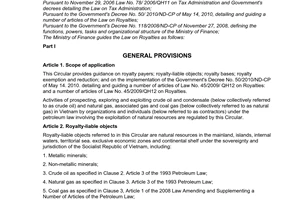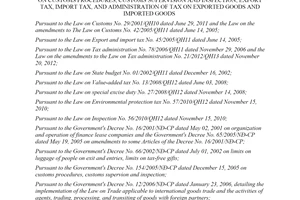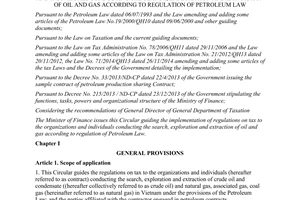Circular No. 32/2009/TT-BTC of February 19, 2009, guiding the implementation of tax provisions applicable to organizations and individuals conducting petroleum prospecting, exploration and exploitation activities under the Petroleum Law đã được thay thế bởi Circular No. 36/2016/TT-BTC tax conducting the search exploration extraction oil gas và được áp dụng kể từ ngày 12/04/2016.
Nội dung toàn văn Circular No. 32/2009/TT-BTC of February 19, 2009, guiding the implementation of tax provisions applicable to organizations and individuals conducting petroleum prospecting, exploration and exploitation activities under the Petroleum Law
|
THE MINISTRY OF
FINANCE |
SOCIALIST REPUBLIC
OF VIET NAM |
|
No. 32/2009/TT-BTC |
Hanoi, February 19, 2009 |
CIRCULAR
GUIDING THE IMPLEMENTATION OF TAX PROVISIONS APPLICABLE TO ORGANIZATIONS AND INDIVIDUALS CONDUCTING PETROLEUM PROSPECTING, EXPLORATION AND EXPLOITATION ACTIVITIES UNDER THE PETROLEUM LAW
Pursuant to the Petroleum Law and its guiding
documents;
Pursuant to tax laws and ordinances and current guiding documents;
Pursuant to Tax Administration Law No. 78/2006/QH11 of November 29, 2006, and
the Government’s decrees detailing the implementation of the Tax Administration
Law;
Pursuant to the Government’s Decree No. 118/2008/ND-CP of November 27, 2008,
defining the functions, tasks, powers and organizational structure of the
Ministry of Finance;
The Ministry of Finance guides the implementation of tax provisions applicable to organizations and individuals conducting petroleum prespecting, exploration and exploitation activities under the Petroleum Law as follows:
Part I.
GENERAL PROVISIONS
Article 1. Scope of application
The guidance in this Circular applies to organizations and individuals (below referred to as contractors) conducting activities of prespecting, exploring and exploiting crude oil and condensate (below collectively referred to as crude oil) or natural gas, associated gas and coal gas (below collectively referred to as natural gas) in Vietnam under the Petroleum Law.
Article 2. Taxpayers
1. For petroleum contracts signed in the form of product-sharing contract, taxpayers are executives.
2. For petroleum contracts signed in the form of joint-administration contract, taxpayers are joint-administration companies.
3. For petroleum contracts signed in the form of joint-venture contract, taxpayers are joint-venture enterprises.
4. In cases where the Vietnam National Petroleum Group or its attached corporations or companies conduct crude oil or natural gas survey, exploration and exploitation activities by themselves, taxpayers are the Vietnam National Petroleum Group or its attached corporations or companies.
Article 3. Currencies used for tax payment
In case crude oil or natural gas is sold in US dollar or another freely convertible foreign currency, the currency used for payment of taxes on crude oil or natural gas exploitation, including export duty, royalties and enterprise income tax, is the US dollar or that freely convertible foreign currency.
In case crude oil or natural gas is sold in Vietnam dong, the currency used for payment of taxes on crude oil or natural gas exploitation, including export duty, royalties and enterprise income tax, is Vietnam dong.
In case crude oil or natural gas is sold in both the US dollar or another freely convertible foreign currency and Vietnam dong, the currency used for payment of taxes on crude oil or natural gas exploitation, including export duty, royalties and enterprise income tax, is Vietnam dong.
The conversion of US dollar or other freely convertible foreign currencies into Vietnam dong for tax payment shall be made at the average inter-bank foreign exchange rate announced by the State Bank of Vietnam at the time of tax payment.
Article 4. Places of tax registration, declaration and payment
1. Places of tax registration, declaration and payment (excluding import duty and export duty) are provincial-level Tax Departments of localities where taxpayers’ principal executive offices are located.
2. For petroleum contracts under which exploitation activities have been carried out before the effective date of this Circular, the places of tax registration, declaration and payment comply with the guidance provided before the effective date of this Circular.
Article 5. Determination of taxable prices of crude oil or natural gas in case crude oil or natural gas is not sold under arm’s length trading contracts
In case crude oil or natural gas is not sold under arm’s length trading contracts, tax administration agencies (tax offices and customs offices) shall determine taxable prices according to the following principles:
- For crude oil: The taxable price is the arithmetic mean of the sale prices of crude oil of the same category on the international market in 3 weeks in a row: the week before, the week of and the week after the sale of crude oil. Taxpayers shall supply tax offices with information on the composition and quality of crude oil being exploited. When necessary, tax offices shall refer to the sale prices on the WTI market (USA), Brent market (England) and Platt’s market (Singapore) or consult competent state management agencies to determine the price of crude oil being exploited by taxpayers.
- For natural gas: The taxable price is the sale price of natural gas of the same category on the market, taking the place of delivery and other relevant factors into account. When necessary, tax administration agencies may consult competent state agencies to determine the price of natural gas being exploited by taxpayers.
Article 6. Other general provisions
1. In case an organization or individual conducts petroleum survey, exploration and exploitation activities under different petroleum contracts, tax provisions guided in this Circular shall be separately applied to each petroleum contract.
2. In case contractors to petroleum contracts in the form of product-sharing contract or joint-administration contract receive the divided contractual shares in crude oil or natural gas and take responsibility to sell these divided shares, the declaration and payment of taxes on crude oil or natural gas exploitation shall be made under separate guidance.
3. Other issues of tax administration not yet specified in this Circular comply with current regulations on tax administration.
Part II.
GUIDANCE ON THE IMPLEMENTATION OF TAX PROVISIONS
I. ROYALTIES
|
Royalty amount payable in crude oil or natural gas |
= |
Daily output of crude oil or natural gas liable to royalties in royalty period |
x |
Royalty rate |
x |
Number of days of crude oil or natural gas exploitation in royalty period |
Article 7. Objects liable to royalties
1. The whole output of crude oil or natural gas exploited and retained from the areas under petroleum contracts and measured at the place of delivery (net crude oil or natural gas output) is liable to royalties.
2. In case the Vietnamese Government consumes but does not pay for the volume of associated gas which is otherwise to be burnt off by taxpayers, taxpayers are not obliged to pay royalties on this volume of associated gas.
3. In the process of crude oil or natural gas exploitation, if taxpayers are permitted to exploit other resources liable to royalties, they shall pay royalties under current legal provisions on royalties.
Article 8. Determination of payable royalty amount
1. Royalty period:
The royally period is the calendar year.
- The first royalty period lasts from the first day of crude oil or natural gas exploitation till the last day of the calendar year.
- The last royalty period lasts from the first day of the calendar year till the day of termination of crude oil or natural gas exploitation.
2. Determination of payable royalty amount:
2.1. Royalties on crude oil or natural gas are determined on the basis of the partial progress of the total net crude oil and natural gas output exploited in each royalty payment period which is calculated according to the daily crude oil or natural gas output exploited under the petroleum contract, the royalty rate and the number of days of exploitation in the royalty period.
2.2. Determination of royalty amount payable in crude oil or natural gas:
In which:
+ The daily output of crude oil or natural gas liable to royalties in the royalty period is the total output of crude oil or natural gas liable to royalties exploited in the royalty period divided by the number of exploitation days in the royalty period.
+ The royalty rate complies with the royalty tariff specified in Article 7 of the Government’s Decree No. 05/2009/ND-CP of January 19, 2009, detailing the implementation of the Ordinance on Royalties and the Ordinance Amending and Supplementing Article 6 of the Ordinance on Royalties. Specifically:
- For crude oil:
|
Output |
Projects eligible for investment promotion |
Other projects |
|
Up to 20,000 barrels/day |
6% |
8% |
|
Between over 20,000 and 50,000 barrels/day |
8% |
10% |
|
Between over 50,000 and 75,000 barrels/day |
10% |
12% |
|
Between over 75,000 and 100,000 barrels/day |
12% |
17% |
|
Between over 100,000 and 150,000 barrels/day |
17% |
22% |
|
Over 150,000 barrels/day |
22% |
27% |
- For natural gas:
|
Output |
Projects eligible for investment promotion |
Other projects |
|
Up to 5 million m3/day |
0% |
0% |
|
Between over 5 and 10 million m3/day |
3% |
5% |
|
Over 10 million m3/day |
6% |
10% |
The identification of projects eligible for investment promotion to serve the application of royalty rates shall be based on the list of petroleum projects eligible for investment promotion decided by the Prime Minister.
+ The number of days of crude oil or natural gas exploitation in the royalty period is the number of days of carrying out the exploitation of crude oil or natural gas in the royalty period, excluding days on which production stops for any reasons.
Example: determining royalties payable in crude oil in case of crude oil exploitation:
Presumably:
+ The total output of crude oil liable to royalties exploited in the royalty period: 72,000,000 barrels
+ The number of production days in the royalty period: 360 days
+ The daily output of crude oil liable to royalties in the royalty period: 200,000 barrels (72,000,000 barrels : 360 days)
+ Crude oil is exploited under contracts outside the list of projects eligible for investment promotion (in case crude oil is exploited under contracts on the list of projects eligible for investment promotion, the payable royalty amount shall be calculated similarly at a royalty rate applicable to projects eligible for investment promotion)
The royalties payable in crude oil in the royalty period is:
{(20,000 x 8%) + (30,000 x 10%) + (25,000 x 12%) + (25,000 x 17%) + (50,000 x 22%) + (50,000 x 27%)} x 360 days = 13,086,000 barrels.
Example: Determining royalties payable in natural gas in case of natural gas exploitation:
Presumably:
+ The total output of natural gas liable to royalties exploited in the royalty period: 3,960,000,000 m3
+ The number of days of production in the royalty period is 360
+ The daily average output of natural gas liable to royalties in the royalty period is 11,000,000 m3 (3,960,000,000 m3 : 360 days)
+ Natural gas is exploited under contracts outside the list of projects eligible for investment promotion (in case natural gas is exploited under contracts on the list of projects eligible for investment promotion, the payable royalties shall be calculated similarly at a royalty rate applicable to projects eligible for investment promotion).
The royalties payable in natural gas in the royalty period is:
{(5,000,000 x 5%) + (1,000,000 x 10%)} x 360 days = 126,000,000 m3
Article 9. Royalty declaration and payment
1. Royalties shall be paid in crude oil or natural gas; in cash; or partially in cash and partially in crude oil or natural gas.
In case royalties are paid in crude oil or natural gas, tax offices shall notify in writing taxpayers thereof 6 months in advance and provide specific guidance on the declaration and payment of royalties in crude oil or natural gas.
2. Declaration and payment of temporarily calculated royalties
2.1. Determination of temporarily calculated royalty amount:
|
Temporarily calculated royalty amount |
= |
Output of crude oil or natural gas actually sold |
x |
Price for temporary royalty calculation |
x |
Temporarily calculated royalty percentage |
In which:
+ The output of crude oil or natural gas actually sold is the output of crude oil or natural gas liable to royalties actually sold.
+ The price for temporary royalty calculation is the sale price of crude oil or natural gas at the place of delivery upon each sale under arm’s length trading contracts, exclusive of value-added tax.
+ The temporarily calculated royalty percentage is determined under the guidance below:
|
Temporarily calculated royalty percentage |
= |
Royalty amount to be paid in crude oil or natural gas in the royalty period |
x |
100% |
|
Output of crude oil or natural gas liable to royalties to be exploited in royalty period |
+ The royalty amount to be paid in crude oil or natural gas in the royalty period is determined under the guidance in Article 8, Section I, Part II of this Circular on the basis of the output of crude oil or natural gas liable to royalties to be exploited in the royalty period and the projected number of exploitation days in the royalty period;
+ The output of crude oil or natural gas liable to royalties projected to be exploited in the royally period is the output of crude oil or natural gas liable to royalties to be exploited in the royalty period.
Based on the output of crude oil or natural gas liable to royalties projected to be exploited every year and the royalty tariff applicable to crude oil or natural gas, taxpayers shall determine the temporarily calculated royalty percentage of each year and notify it to local tax offices where they make tax registration not later than December 1 of the previous royalty period.
If there is any change in the projected crude oil or natural gas output and the projected number of days of petroleum exploitation in the last 6 months of the year, leading to an increase or decrease by at least 15% of the temporarily calculated royalty percentage already notified to tax offices, taxpayers shall determine and notify the new temporarily calculated royalty percentage to tax offices before May 1 of this year.
Example: determining the temporarily calculated royalty percentage:
- Determining the temporarily calculated royalty percentage for crude oil:
Presumably:
+ The total output of crude oil liable to royalties projected to be exploited in the royalty period: 72,000,000 barrels
+ The projected number of exploitation days in the royalty period: 360
+ The daily output of crude oil liable to royalties in the royally period: 200,000 barrels/day (72,000,000 barrels: 360 days).
+ The royalty amount projected to be paid in the royalty period (determined under the guidance in Article 8, Section I, Part II of this Circular): 13,086,000 barrels.
The temporarily calculated royalty percentage for crude oil exploitation is:
x 100% = 18.18%
Determining the temporarily calculated royalty percentage for natural gas:
Presumably:
+ The total output of natural gas liable to royalties exploited in the royalty payment period: 3,960,000,000 m3
+ The number of production days in the royalty payment period: 360
+ The daily output of natural gas liable to royalties in the royalty payment period: 11,000,000 m3/day (3,960,000,000 m3: 360 days)
+ The royalty amount projected to be paid in the royalty period (determined under the guidance in Article 8, Section I, Part II of this Circular): 126,000,000 m3
The temporarily calculated royalty percentage for natural gas exploitation is:
x 100% = 3.182%
2.2. Declaration and payment of temporarily calculated royalties:
2.2.1. For crude oil exploitation:
a/ The royalty declaration dossier is the temporarily calculated royalty declaration, made according to form No. 01/TAIN-DK issued together with this Circular (not printed herein).
b/ The deadline for submission of the temporarily calculated royalty declaration dossier is the 35lh day counting from the date of issuance of invoices (for crude oil sold on the domestic market) or the day the customs office gives certification of the exported crude oil. In case the 35th day falls on a Saturday, Sunday, holiday or new-year day (collectively referred to as holiday), the deadline for submission of the royalty declaration dossier is the day following that holiday.
c/ The deadline for payment of temporarily calculated royalties is the deadline for submission of the temporarily calculated royalty declaration dossier.
2.2.2. For natural gas exploitation
a/ The royalty declaration dossier is the temporarily calculated royalty declaration, made according form No. 01/TAIN-DK issued together with this Circular (not printed herein).
b/ The deadline for submission of temporarily calculated royalty declaration dossiers is the 20th every month. In case the 20th day falls on a holiday, the deadline for submission of royalty declaration dossiers is the day following that holiday.
c/ The deadline for payment of temporarily calculated royalties is the deadline for submission of temporarily calculated royalty declaration dossiers.
3. Royalty finalization
3.1. For crude oil exploitation:
3.1.1. Determination of payable royalty amount:
a/ Determination of royalties in crude oil to be paid in the royalty period:
|
Royalties to be paid in crude oil in royalty period |
= |
Daily output of crude oil liable to royalties in royalty period |
x |
Royalty rate |
x |
Number of days of crude oil exploitation in royalty period |
b/ Determination of the percentage of royalties in crude oil of the exploitation output in the royalty period:
|
Percentage of royalties paid in crude oil in royalty period |
= |
Royalties in crude oil to be paid in royalty calculation period |
x |
100% |
|
The exploitation output of crude oil in royalty period |
c/ Determination of royalties in crude oil sold in the royalty period:
|
Royalties in crude oil sold in royalty period |
= |
Volume of sold crude oil |
x |
Percentage of royalties in crude oil in royalty period |
d/ Determination of the payable amount from the sale of royalties in crude oil in the royalty period:
|
Payable amount from the sale of royalties in crude oil in royalty period |
= |
Royalties in crude oil sold in royally period |
x |
Price for calculation of royalties on crude oil |
In which:
+ Royalties in crude oil sold in the royalty period is determined under the guidance in Clause 3, Article 9, Section I, Part II of this Circular;
+ The price for calculation of royalties on crude oil is the weighted average price of crude oil sold at places of delivery under arm’s length trading contracts in the royally period, exclusive of value-added lax.
e/ Determination of royalties payable in crude oil not yet sold in the royally period for use as a basis for finalization of royalties in crude oil to be paid the subsequent royalty period:
|
Royalties in crude oil not yet sold in the royally period |
= |
Royalties in crude oil not yet sold in previous royalty period |
+ |
Royalties in crude oil to be paid in royalty period |
- |
Royalties in crude oil sold in royalty period |
In case crude oil is not sold under arm’s length trading contracts, the royalty calculation price is determined under the guidance in Article 5, Part I of this Circular.
Example: Determining the royalty calculation price:
|
Price for calculation of royalties on crude oil |
- |
(2,000,000 x 18) + (1,000,000 x 20) + (1,000,000 x 14) |
= |
USD 17.5/barrel |
|
4,000,000 |
Presumably: The crude oil output in the royalty period (4,000,000 barrels) is sold in three lots: lot 1 of 2,000,000 barrels sold at the price of USD 18/ barrel; lot 2 of 1,000,000 barrels sold at the price of USD 20/barrel; lot 3 of 1,000,000 barrels sold at the price of USD 14/barrel.
g/ Determination of the deficient (surplus) amount from the sale of royalties in crude oil in the royalty period:
|
Deficient (surplus) amount from the sale of royalties in crude oil in royalty period |
= |
Payable amount from the sale of royalties in crude oil to be paid in royalty period |
x |
Amount of temporarily calculated royalties already paid in royalty period |
In which:
+ The payable amount from the sale of royalties in crude oil in the royalty period is determined under the guidance in Clause 3, Article 9, Section I, Part II of this Circular.
+ The temporarily calculated royalty amount already paid in the royalty period is the total temporarily calculated royalty amount already paid according to the submitted list of temporarily calculated royalties (made according to form No. 02-2/TAIN-DK issued together with this Circular) (not printed herein).
3.1.2. Royally declaration and payment according to royalty finalization declaration dossiers:
a/ A dossier of royalty finalization declaration comprises:
A royalty finalization declaration, made according to form No. 02/TAIN-DK issued together with this Circular (not printed herein);
- A list of outputs and sales of crude oil or natural gas exploited in the royalty period, made according to form No. 02-1/TAIN-DK issued together with this Circular (not printed herein);
- A list of temporarily calculated royalty amounts in the royalty period, made according to form No. 02-2/TAIN-DK issued together with this Circular (not printed herein).
b/ Time limits for submission of royalty finalization declaration dossiers:
90 days from the last day of the calendar year.
45 days from the date of termination of the petroleum contract.
In case the 90th or the 45th day falls on a holiday, the deadline for submission of royalty tax finalization declaration dossiers is the day following that holiday.
c/ Royalty payment according to royalty finalization declaration dossiers:
Based on royalty finalization declaration dossiers:
- If the temporarily calculated royalty amount in the royalty period is larger than the payable tax amount, the surplus amount shall be cleared against the payable tax amount in the next payment of temporarily calculated royalties or taxpayers shall carry out procedures for being refunded the surplus royalty amount in accordance with current legal provisions on tax administration, if there is no subsequent royally payment period.
- If the temporarily calculated royalty amount in the royalty period is smaller than the payable tax amount, taxpayers shall pay the deficient amount to state treasuries within the time limit for submission of royalty finalization declaration dossiers.
3.2. For natural gas exploitation:
3.2.1. Determination of the payable royalty amount
a/ Determination of royalties to be paid in natural gas in the royalty period:
|
Royalties in natural gas to be paid in royalty period |
= |
Daily average output of natural gas liable to royalties in royalty period |
x |
Royalty rate |
x |
Number of days of natural gas exploitation in royalty period |
b/ Determination of payable amount from the sale of royalties in natural gas in the royalty period:
|
Payable amount from the sale of royalties in natural gas to be paid in royalty period |
= |
Royalties in natural gas to be paid in royalty period |
x |
Price for calculation of royalties on natural gas |
In which:
+ Royalties in natural gas to be paid in the royalty period is determined under the guidance in Clause 3, Article 9, Section I, Part II of this Circular;
+ The price for calculation of royalties on natural gas is the sale price under arm’s length trading contracts at the place of delivery in the royalty period, exclusive of value-added tax.
In case natural gas is not sold under arm’s length trading contracts, the royalty calculation price shall be determined under the guidance in Article 5, Part I of this Circular.
c/ Determination of the deficient (or surplus) amount from the sale of royalties in natural gas to be paid in the royalty period:
|
Deficient (or surplus) amount from the sale of royalties in natural gas to be paid in royalty period |
= |
Payable amount from the sale of royalties in natural gas to be paid in royalty period |
x |
Temporarily calculated royalty amount already paid in royalty period |
In which:
+ The payable amount from the sale of royalties in natural gas to be paid in the royalty period is determined under the guidance in Clause 3, Article 9, Section I, Part II of this Circular.
+ The temporarily calculated royalty amount already paid in the royalty period is the total temporarily calculated royalty amount already paid according to the submitted list of temporarily calculated royalty amounts (made according to form No. 02-2/TAIN-DK issued together with this Circular) (not printed herein).
3.2.2. Royalty declaration and payment according to royalty finalization declaration dossiers:
a/ A dossier of royalty finalization declaration comprises:
A royalty finalization declaration, made according to form No. 02/TAIN-DK issued together with this Circular (not printed herein);
- A list of outputs and sales of crude oil or natural gas exploited in the royalty period, made according to form No. 02-1/TAIN-DK issued together with this Circular (not printed herein);
- A list of temporarily calculated royalty amounts in the royalty period, made according to form No. 02-2/TAIN-DK issued together with this Circular (not printed herein).
b/ Time limits for submission of royalty finalization declaration dossiers:
Within 90 days from the last day of the calendar year.
Within 45 days after the date of termination of the petroleum contract.
In case the 90th or the 45th day falls on a holiday, the deadline for submission of royalty finalization declaration dossiers is the day following that holiday.
c/ Royalty payment according to tax finalization declaration dossiers:
Based on royalty finalization declaration dossiers:
- If the temporarily calculated royalty amount in the royalty period is larger than the payable amount, the surplus amount may be cleared against the payable amount in the next payment of temporarily calculated royalties or taxpayers shall carry out procedures for being refunded the surplus amount in accordance with current legal provisions on tax administration, if there is no subsequent royalty payment period.
If the temporarily calculated royalty amount in the royalty period is smaller than the payable amount, taxpayers shall pay the deficient amount to the state treasuries within the time limit for submission of royalty finalization declaration dossiers.
II. IMPORT DUTY AND EXPORT DUTY
Taxpayers shall declare and pay import duty and export duty according to the law on import duty and export duty and current legal provisions on tax administration. Besides, the Ministry of finance guides some specific contents as follows:
Article 10. Export duty
1. Determination of the payable export duty amount:
|
Payable export duty amount |
= |
Volume of exported crude oil or natural gas |
x |
Dutiable price |
x |
Export duty percentage |
In which:
+ The volume of exported crude oil or natural gas is the volume of crude oil or natural gas actually exported.
+ The dutiable price is the sale price of crude oil or natural gas under arm’s length trading contracts. In case crude oil or natural gas is not sold under arm’s length trading contracts, the export duty calculation price is determined under the guidance in Article 5, Part I of this Circular.
- The export duty percentage is determined as follows:
|
Export duty percentage |
= |
100% |
- |
Percentage of temporarily calculated royalties in royalty period |
x |
Export duty rate applicable to crude oil or natural gas |
In which:
+ The temporarily calculated royalty percentage in the royalty period is determined under the guidance in Article 8, Section I, Part II of this Circular.
+ The export duty rate applicable to crude oil or natural gas complies with the current Export Tariff.
Example: Determining the crude oil export duty percentage:
Presumably:
+ The temporarily calculated royalty percentage in the example in Article 9 above: 18.18%.
+ The export duty rate applicable to crude oil according to the current Export Tariff: 10%
The percentage of crude oil export duty: 8.18% = (100% - 18.18%) x 10%.
Based on the temporarily calculated royalty percentage and the export duty rate applicable to crude oil, taxpayers shall determine the export duty percentage for each petroleum contract and notify it to the customs office where export procedures are carried out and the tax office where they make tax registration within the time limit for notification of the temporarily calculated royalty percentage stated in Article 8, Section I, Part II of this Circular.
2. Export duty declaration and payment:
The procedures for declaration and payment of export duty on exported crude oil or natural gas comply with legal provisions on import duty, export duty and tax administration.
Particularly the deadline for payment of export duty on crude oil: Not later than the 35th day from the date the customs office gives certification of the exported crude oil. In case the 35th day falls on a holiday, the deadline for payment of export duty is the day following that holiday.
Article 11. Import duty exemption
Taxpayers are exempt from import duty on goods imported for petroleum survey, exploration and exploitation activities in accordance with the law on import duty and export duty and current legal provisions on tax administration.
III. ENTERPRISE INCOME TAX (EIT)
Article 12. Objects liable to EIT
Incomes from crude oil or natural gas survey, exploration and exploitation activities and other incomes of taxpayers are liable to EIT.
Article 13. EIT calculation period
1. The EIT calculation period is the calendar year. In case taxpayers apply a fiscal year other than the calendar year which has been approved by the Ministry of Finance, the tax period is that fiscal year.
2. The first EIT calculation period is counted from the first day of petroleum survey, exploration or exploitation activities to the last day of the calendar year or fiscal year.
3. The last EIT calculation period is counted from the starting day of the calendar year or fiscal year to the termination dale of the petroleum contract.
4. In case the tax period of the first year or the last year is shorter than 3 months, it may be added up with the tax period of the following year or previous year to form an EIT calculation period. The EIT period of the first year or the last year must not exceed 15 months.
Article 14. Determination of taxable income
|
Taxable income in tax period |
= |
Turnover from crude oil or natural gas survey, exploration and exploitation in tax period |
- |
Deductible expenses in tax period |
+ |
Other incomes in tax period |
1. Turnover from crude oil or natural gas survey, exploration and exploitation means the whole value of crude oil or natural gas actually sold under arm’s length trading contracts in the tax period.
In case crude oil or natural gas is not sold under arm’s length trading contracts, turnover from crude oil or natural gas survey, exploration and exploitation is determined by multiplying the corresponding volume of crude oil or natural gas by the sale price determined by tax offices as guided in Article 5, Part I of this Circular.
2. Deductible expenses upon determination of taxable income:
When determining taxable income, taxpayers may subtract expenses (except those specified in Clause 3 below) as reasonable expenses, if the following conditions are fully met:
- Actually paid expenses related to crude oil or natural gas survey, exploration and exploitation activities which, however, must not exceed the expense determined by multiplying sales of crude oil or natural gas by the expense recovery percentage agreed upon in the petroleum contract. In case the petroleum contract contains no agreement on the expense recovery percentage, the expense recovery percentage used as a basis for determination of deductible expenses is 35%.
- Expenses have all lawful invoices and vouchers as prescribed by law.
3. Non-deductible expenses upon determination of taxable income:
- To-be-recovered expenses exceeding the percentage agreed upon in the petroleum contract. In case the petroleum contract contains no agreement on the expense recovery percentage, the expense recovery percentage used as a basis for determination of non-deductible expenses is 35%.
Expenses not allowed to be treated as to-be-recovered expenses as provided for in the petroleum contract.
Other expenses not allowed to be treated as deductible expenses as prescribed by the current law on EIT.
4. In cases where as agreed upon in the petroleum contract, each contractor directly pays expenses for the procurement of goods and services related to petroleum survey, exploration and exploitation activities and sells crude oil or natural gas, these expenses shall be transferred to the taxpayer for calculation as deductible expenses upon determination of taxable incomes by the way whereby each contractor shall issue value-added invoices indicating the cost value and value-added tax (if any).
5. Other expenses in the tax period comply with the Law on EIT and current guiding documents.
Article 15. Determination of the payable EIT amount
1. Determination of the payable EIT amount:
|
Payable EIT amount in tax period |
= |
Taxable income in tax period |
x |
EIT rate |
In which:
+Taxable income in the tax period is determined under the guidance in Article 14, Section III, Part II of this Circular.
+ The EIT rate is prescribed in Article 10 of the Law on EIT.
2. For petroleum contracts signed in the form of product-sharing contract or joint-execution contract: In case each contractor specifies the EIT amount to be paid separately, the payable EIT amount of each contractor shall be determined by multiplying the total payable EIT amount (determined under the above guidance) by the petroleum profit percentage of each contractor to the petroleum contract.
Article 16. EIT declaration and payment
1. EIT shall be temporarily calculated on a quarterly basis or upon each sale and finalized according to the tax period.
2. Before or in the course of conducting crude oil or natural gas exploitation activities, if taxable incomes are generated from other business activities, taxpayers shall declare and pay EIT in accordance with the current law on EIT.
3. If each contractor to the petroleum contract separately determines its payable EIT amount, taxpayers shall make EIT declaration (specifying the payable EIT amount of each contractor) and pay EIT for each contractor. Tax payment vouchers shall be written with the name and the payable EIT of each contractor.
4. Declaration and payment of temporarily calculated EIT
For petroleum contracts for which the percentage of temporarily calculated EIT under the guidance below, EIT shall be temporarily calculated upon each sale.
4.1. Determination of the temporarily calculated EIT amount:
|
Temporarily calculated EIT amount |
= |
Sales of crude oil or natural gas |
x |
Temporarily calculated EIT percentage |
In which:
+ The sales of crude oil or natural gas are the whole value of net oil and gas output sold under the arms’ length trading contract of each sale.
In case crude oil or natural gas is not sold under arm’s length trading contracts, the turnover from the sale of crude oil or natural gas shall be determined by multiplying the corresponding volume of crude oil or natural gas by the sale price determined by tax offices under the guidance in Article 5, Part I of this Circular.
+ The temporarily calculated EIT percentage is determined as follows:
|
Percentage of temporarily calculated EIT |
= |
100% |
- |
Percentage of expenses allowed to be recovered |
- |
Percentage of temporarily calculated royalty |
- |
Export duty percentage |
x |
EIT rate |
Taxpayers shall determine by themselves the percentage of temporarily calculated EIT and notify it to local tax offices where they make tax registration within the time limit for the notification of the percentage of temporarily calculated royalty stated in Article 9, Section I, Part II of this Circular.
Example: Determining the percentage of temporarily calculated EIT for crude oil exploitation:
Presumably:
+ The percentage of expenses allowed to be recovered: 35%
+ The temporarily paid royalty percentage (according to the example in Article 9 above): 18.18%
+ The temporarily paid export duty percentage (according to the example in Article 10 above): 8.18%
+ The EIT rate: 50%
The percentage of temporarily calculated EIT is:
(100% - 35% - 18.18% - 8.18%) x 50% = 19.32%
In case of paying temporarily calculated EIT for income from natural gas exploitation, the percentage of temporarily calculated EIT is determined similarly as above.
4.2. Declaration and payment of temporarily calculated EIT:
4.2.1. In case taxpayers can determine the temporarily calculated EIT for each sale:
a/ The dossier of temporarily calculated EIT declaration is the temporarily calculated EIT declaration, made according to form No. 01/TNDN-DK issued together with this Circular (not printed herein).
b/ The time limit for submission of temporarily calculated EIT declaration dossiers: Within 35 days from the date of issuance of invoices (for crude oil sold on the domestic market) or the date customs offices give certifications of exported crude oil. In case the 35th day falls on a holiday, the deadline for submission of temporarily calculated EIT dossiers is the day following that holiday.
c/ The time limit for payment of temporarily calculated EIT is the time limit for submission of dossiers of temporarily calculated EIT declaration.
4.2.2. In case EIT is temporarily calculated on a quarterly basis. EIT declaration and payment shall be made under the law on tax administration.
4.2.3. Taxpayers shall notify local tax offices where they make tax registration of whether the temporarily calculated EIT is paid upon each sale or on a quarterly basis.
5. EIT finalization
5.1. A dossier of EIT finalization declaration comprises:
An EIT finalization declaration, made according to form No. 02/TNDN-DK issued together with this Circular (not printed herein)
The financial statement of the year or the financial statement up to the time of termination of the petroleum contract.
5.2. Time limit for submission of EIT finalization declaration dossiers:
Within 90 days from the last day of the calendar year or fiscal year.
Within 45 days from the date of termination of the petroleum contract.
In case the 90th or the 45th day falls on a holiday, the deadline for submission of EIT finalization declaration dossiers is the day following that holiday.
5.3. Tax payment according to EIT finalization declaration dossiers:
Based on EIT finalization declaration dossiers:
- If the temporarily calculated EIT amount in the tax period is larger than the payable tax amount, the surplus EIT amount shall be subtracted from the tax amount to be paid in the next payment of temporarily calculated EIT or taxpayers shall carry out procedures for being refunded the surplus EIT amount in accordance with current legal provisions on tax administration, if there is no subsequent EIT payment period.
- If the amount of temporarily calculated EIT in the tax period is smaller than the payable tax amount, taxpayers shall pay the deficient tax amount to state treasuries within the time limit for submission of dossiers of EIT finalization declaration.
IV. TAXES ON INCOME FROM THE TRANSFER OF CAPITAL AMOUNTS CONTRIBUTED FOR PARTICIPATION IN PETROLEUM CONTRACTS
Article 17. Taxable objects
1. Transfer of the capital amount contributed for participation in a petroleum contract means the transfer of a part or whole of the capital amount already invested in crude oil or natural gas survey, exploration and exploitation activities by an organization or individual (the transferor) to one or several other organizations or individuals (the transferee), including the case of transferring only rights and obligations in the petroleum contract. The transferee of the capital amount contributed for participation in a petroleum contract will have obligations and interests of a contractor conducting petroleum survey, exploration and exploitation activities.
2. Income from the transfer of the capital amount contributed for participation in a petroleum contract from the transferor to the transferee is subject to EIT under the guidance in Section IV, Part II of this Circular.
Article 18. Determination of the payable EIT amount
1. Determination of the payable EIT amount:
The EIT on income from the transfer of the capital amount contributed for participation in a petroleum contract is determined as follows:
|
Payable EIT amount |
= |
Taxable income |
x |
EIT rate |
1.1. Determination of taxable incomes:
|
Taxable income |
= |
Transfer price |
- |
Purchase price of transferred capital amount |
- |
Transfer expenses |
In which:
+ The transfer price is the total actual value according to the market price received by the transferor under the transfer contract.
In case the capital transfer contract provides for installment or deferred payment, the transfer price is exclusive of interests on installment or deferred payments within the time limit prescribed in the transfer contract.
In case the transfer contract does not state a payment price or the tax office has grounds to believe that the payment price is not determined according to the market price, the tax office may examine and request the parties to the transfer to supply information relating to the determination of the present and future value of the capital amount contributed for participation in the petroleum contract before these parties decide on the transfer and carry out the transfer and fix the payment value of the contract on the basis of reference to the market price, the price of possible sale to a third party and the sale prices under similar transfer contracts
+ The purchase price of the transferred capital amount is determined on the basis of accounting books, invoices and vouchers on expenses allowed to be recovered by the transferor at the time of capital transfer, after subtracting the recovered expenses (if any), recognized by the parties to the petroleum contract and the Vietnam National Petroleum Group and other expenses related to the purchase price of the transferred capital amount which are not yet calculated as expenses allowed to be recovered.
In case the contractor further transfers the transferred capital amount, the prime cost of the capital amount to be transferred at each subsequent time is the transfer value of the preceding transfer contract plus expenses accounted as recovered expenses which are added by the contractor (if accompanied with valid vouchers) subtracting expenses already recovered (if any).
In case the accounting of the petroleum contract is made in a foreign currency and the contractor transfers the capital amount contributed for participation in the petroleum contract in that foreign currency, the transfer price and the purchase price of the transferred capital amount shall be determined in that foreign currency. In case the accounting of the petroleum contract is made in Vietnam dong but the contractor transfers the capital amount contributed for participation in the petroleum contract in a foreign currency, the transfer price shall be converted into Vietnam dong at the exchange rate at the time of transfer and the purchase price of the transferred capital amount shall be determined in Vietnam dong at the exchange rate at the time of contribution of capital to the petroleum contract or the time of re-purchase of the capital amount contributed for participation in the petroleum contract.
+ Transfer expenses are actually paid expenses directly related to the transfer and accompanied with vouchers accepted by tax offices. In case transfer expenses arise overseas, these original vouchers must be certified by a notary office or independent audit organization in the country where these expenses arise and translated into Vietnamese (with the certification of a competent representative).
Transfer expenses include: expenses for completion of legal procedures necessary for the transfer; charges and fees to be paid upon carrying out transfer procedures; expenses for transaction, negotiation and conclusion of the transfer contract and other expenses with valid vouchers.
1.2. EIT rate:
The EIT rate applicable to income from capital transfer is the tax rate prescribed in the Law on EIT applicable to business establishments which do not conduct petroleum survey, exploration and exploitation activities.
1.3. EIT exemption and reduction are not applicable to income from capital transfer.
Article 19. Declaration and payment of EIT on incomes from capital transfer
1. For transferors being foreign organizations or individuals participating in petroleum contracts
1.1. The transferee shall determine the payable EIT amount and declare, deduct and pay tax for the capital transferor.
1.2. For income from capital transfer, a dossier of tax declaration comprises:
- A declaration of enterprise income tax on income from capital transfer, made according to form No. 03/TNDN-DK issued together with this Circular (not printed herein);
A copy of the transfer contract. For a foreign-language transfer contract, such principal details as the transferor, the transferee, transfer time, transfer contents, rights and obligations of each party; contractual value; time, mode and currency for payment, must be translated into Vietnamese;
A copy of the decision approving the transfer of capital, made by a competent authority;
- A copy of the written certification of the executive, joint-administration company or parties to the joint-venture of expenses allowed to be recovered which are the prime cost of the transferred capital amount of the transferor;
- Original vouchers of expenses.
In case of necessity to supplement the dossier, tax offices shall notify taxpayers promptly on the date of receiving the dossier, if directly receiving the dossier, or within 3 working days after the date of receiving the dossier sent by post or e-transaction.
1.3. The deadline for submission of tax declaration dossiers is the 10th day from the date a competent authority approves the transfer of capital.
1.4. The place of submission of tax declaration dossiers: At tax offices where taxpayers defined in Article 2, Part I of this Circular make declaration and payment of enterprise income tax for crude oil and natural gas survey, exploration and exploitation activities.
2. For capital transferors being Vietnamese organizations and individuals participating in petroleum contracts: The performance of tax obligations for income from the transfer of capital amounts contributed for participation in petroleum contracts comply with current tax laws.
V. OTHER TAXES, CHARGES AND FEES
In the course of conducting production and business activities, taxpayers shall pay other taxes, charges and fees not yet specified in this Circular according to current legal provisions on taxes, charges and fees.
Part III.
ORGANIZATION OF IMPLEMENTATION
Article 20. Effect
1. This Circular takes effect 45 days from the date of its signing and applies to the enterprise income tax period from 2009 and to the payment of royalties for petroleum contracts signed from the effective dale of the Government’s Decree No. 05/2009/ND-CP of January 19, 2009, detailing the implementation of the Ordinance on Royalties (amended) and the Ordinance Amending and Supplementing Article 6 of the Ordinance on Royalties (amended), except petroleum contracts for which the Prime Minister has approved the specific royalty rates before the effective date of the Government’s Decree No. 05/2009/ND-CP and replaces the Finance Ministry’s Circular No. 48/2001/TT-BTC of June 25, 2001, guiding the implementation of tax provisions applicable to organizations and individuals conducting petroleum survey, exploration and exploitation under the Petroleum Law.
2. Petroleum contracts signed before the effective date of the Government’s Decree No. 05/2009/ND-CP of January 19, 2009, detailing the implementation of the Ordinance on Royalties (amended) and the Ordinance Amending and Supplementing Article 6 of the Ordinance on Royalties (amended), under which natural resources have been exploited and royalties have been paid according to their investment licenses or petroleum contracts, the provisions of their investment licenses or petroleum contracts will apply. For petroleum contracts not yet concluded but already approved by the Prime Minister before the effective date of the above-said Decree which contain agreements on royalties, the agreements of the contracts approved by the Prime Minister will apply.
3. Petroleum contracts with investment licenses granted before the effective date of Petroleum Law No. 10/2008/QH12 and Enterprise Income Tax Law No. 14/2008/QH12 which are currently entitled to enterprise income tax incentives under their granted investment licenses will further enjoy tax incentives (preferential tax rates and tax exemption and reduction duration) for the remaining period.
Taxpayers shall base on the provisions of their investment licenses or the Prime Minister’s decisions on the level and duration of enterprise income tax exemption and reduction to determine the exempted or reduced tax amounts and the payable enterprise income tax amounts upon temporary calculation and finalization of enterprise income tax.
The first year of taxable income generation is the first tax period of taxable income generation.
Incomes eligible for enterprise income tax exemption or reduction do not include other incomes defined in Clause 5, Article 14, Section III, Part II of this Circular.
4. In case treaties and inter-governmental agreements which the Vietnamese Government has signed or acceded to contain provisions on taxes applicable to crude oil or natural gas survey, exploration and exploitation activities which are different from those of this Circular, organizations and individuals conducting crude oil or natural gas survey, exploration and exploitation activities shall pay taxes under these treaties or inter-governmental agreements.
Any difficulties and problems arising in the course of implementation should be promptly reported to the Ministry of Finance for timely settlement.
|
|
FOR THE MINISTER OF
FINANCE |

